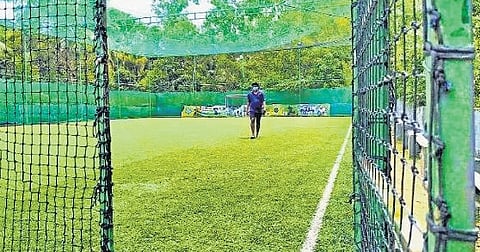

THIRUVANANTHAPURAM: Having sprung up in the nooks and crannies of the state over the past few years, artificial turfs have lost fizz. Reason: poor maintenance, stringent regulations – including night-time restriction and license renewal – imposed by local self-governments, and in some areas, ‘more supply than demand’.
A majority of the sports turfs, mostly small-sized football fields that sometimes double up as cricket fields, started operations during the pandemic period and received good patronage as many sports enthusiasts were working from home. But when the working arrangements changed post-pandemic, the numbers of people playing on the artificial turfs decreased drastically. And many such sports facilities have been shut down over the past couple of years.
According to the statistics available with the local self-government department, as many as 2,400 new turfs were opened during the period 2020-21. But only 350 new turfs were opened during the 2022-23 period. While many were closed down, many are on the verge of closure. The validity of the license for the turfs is one year and many turfs in the state have not even renewed their licenses in the past two years, a source with the LSG department said.
The office-bearers of the Trivandrum Turfs Association say that around 30% of the artificial turfs were closed down in the past two years, with many more struggling to survive. Given the circumstances, the turf owners from various districts are planning to form a statewide association to ensure the welfare of those struggling among them. The association said most of the turfs shut down were in the Malabar region as there was “more supply than demand”.
Rajeev Krishnakurukkal, who owns a cricket club in Thiruvananthapuram, says only those turfs owned and managed by financially sound owners are holding on.
“Many medium and small turfs are on the verge of closure. In Thiruvananthapuram alone, 25% of the turfs have been closed down. This is mainly because of a lack of maintenance,” says Rajeev, who plays on artificial turfs. The artificial grass on the turf needs to be replaced every six months, he says.
“But many turf owners couldn’t do it because of the low revenue post-pandemic. They are unable to meet even operational costs. The other issue is that the players suffered injuries because of the poor condition of the turfs. That too prompted sports enthusiasts to keep away from the turfs,” Rajeev pointed out.
Akhil H S, the owner of Ozone Turf at Manacaud in Thiruvananthapuram district and a member of the Trivandrum Turfs Association, says, “During the pandemic, there was a lifestyle change as people were concerned about their health and hence focused on improving their fitness. Moreover, many of them were inside houses. But that is not the situation now. Our association also met the city corporation recently requesting the authorities not to impose more restrictions.”
Hashim T, a staff member of Club One Turf in Malappuram, says the numbers of players and teams registering on artificial turfs is coming down.
“It is true that the popularity of artificial turfs has come down. There was a boom three years ago. At the time, turfs mushroomed throughout the state. The regulations by the local self-governments have also contributed to the current situation. As per the rule, the turfs should be closed down by 10pm and the lights shouldn’t be on after that. But players want to be in the game beyond 11pm,” he says.
Last year, the Thiruvananthapuram corporation formulated a bylaw regulating the functioning of artificial football and cricket turfs and playgrounds on private land, besides imposing an annual license fee. According to the corporation officials, they have been getting complaints from residents in some areas over the difficulties caused by the constant noise from turfs and the flood lights located in the neighbourhood, even late at night.
Other regulations
If the structures are of a permanent nature, permission will be accorded as per the town planning scheme, the master plan and the Kerala Municipal Building Rules
If the area comes under the Kerala Paddy and Wetland Act, the necessary permissions have to be secured
The LSGs concerned have to clear the permit within 15 days of the application, if there are no violations
On completion of construction, an occupancy certificate also has to be secured
A license number will be allocated for the turf on clearing the license application
The license is liable to be cancelled if officials find violations during inspections
The functioning time of the turfs have to be limited to 5am-10pm
Loud noises and other disturbances which cause difficulties to people in the neighbourhood have to be avoided